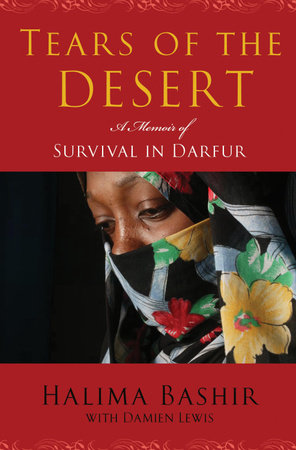Tears of the Desert Reader’s Guide
By Halima Bashir Damien Lewis


1. Halima Bashir gives rich details about the story of her birth. What do you recall about your own birth story and those of your family? How are births celebrated in your family, in your society?
2. Like Bashir’s white eyelash, do you have a special feature that makes you stand out, that you feel brings you luck and success?
3. Bashir makes several notes about the Zaghawa standards of beauty. Hair is often braided in a variety of styles, and long hair is especially treasured. The “Zaghawa believe that scarring makes women look beautiful” (p.13), and “Zaghawa men like their women plump” (p.14). How do these ideals of beauty compare or contrast with those of your culture?
4. Bashir’s father would have preferred the family buy water and buy firewood, while her grandmother wanted Halima and her friends to fetch it, even if the sources were far away. She did this to teach the girls how to work hard and justly appreciate the fruits of their labors. Do you think these lessons came in handy for Bashir and Kadiga? Were they at all useful? What similar chores have you undertaken? How did your parents communicate to you the value of hard work?
5. “In Zaghawa culture, there was nothing worse than the thought that your daughter might fail to find, or keep, her own Zaghawa man” (p.26). In your culture, how are ideas and expectations of marriage and adult relationships expressed? How are marriage rules communicated, and roles assigned? What happens to adult women who find themselves unmarried, and how does this contrast with people ’s opinions of unmarried men?
6. The Zaghawa language was not written down until 1986; previously, the society’s history was proudly passed down orally from generation to generation. How have you learned about your own history? Do you know as much of your family and national history as you’d like? What tools would you use to record your current events to inform and educate your descendants? What information would be most important for you to share?
7. Bashir writes, “Eating alone was considered a sin, and it was as bad, if not worse, than living alone. And it was better to be dead than to be bereft of one ’s family” (p.28). What mealtime rituals do you follow? How does your mealtime experience differ in those settings?
8. Bashir’s father was reluctant to buy new toys for his children after her little brother’s toys were stolen, so Bashir and her brothers had to make their own entertainment. How did you entertain yourself as a child? What creative things did you do for fun when you didn’t have the toys you wanted?
9. “Such customs might seem barbaric to outsiders, but to us that was the way things had always been. Our identity as Zaghawa was defined by such traditions” (p.36). What traditions define you, your culture, and your way of life?
10. Halima ran from her facial scarring, but welcomed her circumcision. Why do you think this was? Why do you think female circumcision is such an important ritual in some cultures?
11. In the face of ridicule from the Arab girls at school, Halima was determined to practice her Arabic and study hard to succeed. How would you have behaved in a similar situation? How do you handle having to work against difficult odds, or in tough and contrary environments?
12. “[The Arabs] were a minority in Sudan, so how was it that the best homes and the best jobs were reserved for them?” (p.99). How would you answer Halima’s question? Have you seen this type of social stratification play out elsewhere in the world?
13. How did you understand the conflict between the Arabs and the black African tribes? Where do you think this conflict had its origins? Do you think this conflict is strictly confined to Sudan? Where else in the world do you see similar strife, and what solutions, if any, would you recommend?
14. “The Arab man had openly called the African man a ‘black dog’ and a ‘black slave.’ That meant that he had also called me a black dog and a slave–for the African man and I were the same color, with similar facial features” (p.125). Have you ever aligned yourself with someone who was being ridiculed or mistreated? What did you feel you had in common with him? And how did you respond to the mistreatment?
15. “More than ever before now, I felt as if I was no longer of the village. My education has alienated me” (p.130). Have you ever felt separated from your peers because of your life experiences?
16. As Halima completed her medical training, she learned to distinguish between which traditional medicines were effective (like the taro shrub) and which antiquated practices were harmful (certain types of cutting). What holistic remedies do you rely on?
17. As the war escalated, Halima found her Arab university friends shocked by her fierce loyalty to her black African countrymen. Have you ever found yourself at odds with your close friends, divided by political, social, or religious differences?
18. How did you feel in reading the story of Halima’s reunion with Sharif? What about their first days together as husband and wife stirred you most? In what ways does Sharif ’s attitude toward Halima typify the character of Zaghawa men?
19. When Halima was approached by reporters asking her to share her story, at first she was hesitant. How would you explain her hesitancy, and would you have spoken up, broken the silence? And how would you explain her admission–and that of some of the girls she treated in Darfur–that sharing their most painful stories actually helped them to feel better, helped them to heal?
Just for joining you’ll get personalized recommendations on your dashboard daily and features only for members.
Find Out More Join Now Sign In